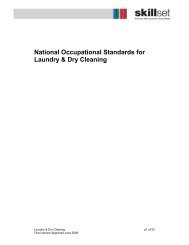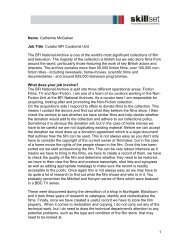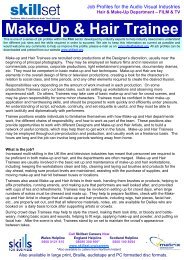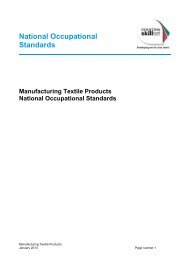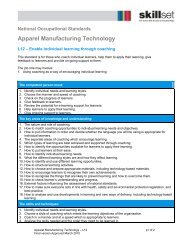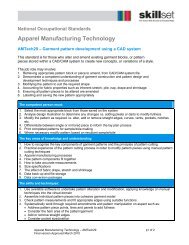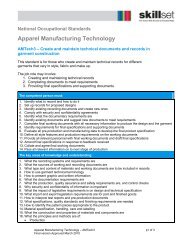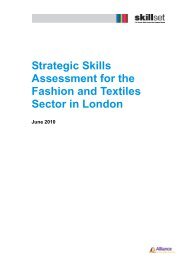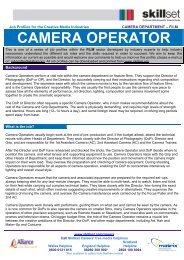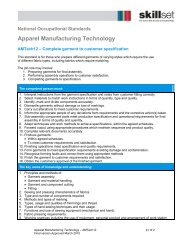CAREER PROFILE CLOTHING ALTERATION HAND - Skillset
CAREER PROFILE CLOTHING ALTERATION HAND - Skillset
CAREER PROFILE CLOTHING ALTERATION HAND - Skillset
Create successful ePaper yourself
Turn your PDF publications into a flip-book with our unique Google optimized e-Paper software.
Textile technologists<br />
are concerned with the<br />
scientific make-up of<br />
fabrics. They may work in<br />
production, quality control,<br />
sourcing or research and<br />
development teams.<br />
What does a textile<br />
technologist do<br />
Textile technologists often work<br />
in-house for clothing companies,<br />
conducting research and sourcing<br />
fabrics to meet a brief. They may<br />
also support the buying, marketing<br />
and sales teams within the company.<br />
Duties will include sourcing<br />
fabrics that are fit for purpose,<br />
conducting quality control tests for<br />
properties such as crease resistance.<br />
Experimenting with dyeing or<br />
production processes and liaising<br />
with suppliers to get the right fabric<br />
at the right price.<br />
Textile technologists often work in<br />
a supervisory or management<br />
capacity, overseeing the running<br />
of a team of people.<br />
The salary of a fabric technologist<br />
Starting salary is usually around<br />
£21,000 a year. This will increase to<br />
between £25,000 and £35,000 a<br />
year with experience. A research and<br />
development textile technologist or<br />
those with management duties may<br />
earn up to £45,000 a year.<br />
Hours and working environment<br />
Textile technologists usually work<br />
around 40 hours a week. Early<br />
morning or late night work may be<br />
required when liaising with overseas<br />
suppliers or overseeing production<br />
runs. Travel within the UK and<br />
overseas may also be required.<br />
Textile technologists are usually<br />
based in an office within the<br />
production facility. They will also<br />
spend much of their time in a<br />
laboratory environment when<br />
conducting fabric testing.<br />
Skills and interests<br />
It may be useful for someone<br />
considering a career as a textile<br />
technologist to have some of the<br />
following skills and interests:<br />
* able to lead a team and<br />
prioritise workloads<br />
*<br />
*<br />
*<br />
have excellent communication<br />
and organisation skills<br />
be knowledgeable of production<br />
processes and textile fabrics<br />
interested in solving problems and<br />
experimenting with new ideas<br />
Entry into a career in<br />
textile technology<br />
Most employers in this area will<br />
expect candidates to have a degree<br />
or a HND in a relevant subject, such<br />
as chemistry, physics, maths, textile<br />
science or textile management.<br />
There are a wide variety of courses<br />
available at this level, for more<br />
information, visit the UCAS website:<br />
www.ucas.co.uk<br />
Promotion without degree from a<br />
relevant position, such as a textile<br />
technician, may also be possible.<br />
Further training to develop a<br />
career in textile technology<br />
Further training is usually carried<br />
out on the job under the supervision<br />
of more experienced colleagues.<br />
Large companies may also offer<br />
management training schemes<br />
for their textile technologists.<br />
The Textile Institute offers a range<br />
of qualifications for those working in<br />
this area. For more information on<br />
these, visit the website: www.texi.org<br />
Opportunities in the field of<br />
textile technology<br />
With experience, it is possible for a<br />
textile technologist to take on wider<br />
responsibilities within technical<br />
management, production and<br />
quality control.<br />
Those with the relevant skills and<br />
experience may also be able to<br />
work on a self-employed basis,<br />
providing consultations for a<br />
variety of different companies.<br />
Case study<br />
Cheryl Murray has<br />
worked for Simon Jersey,<br />
a leading corporate and<br />
workwear specialist<br />
based near Accrington,<br />
for two years as a textile<br />
technologist. Cheryl<br />
has twenty four years<br />
experience in the job for<br />
a number of companies.<br />
Cheryl completed an<br />
Associateship of the Textile<br />
Institute that gave her a<br />
good understanding of the<br />
scientific make-up of fibres<br />
and the processes they go<br />
through to become finished<br />
fabrics. Cheryl says “The<br />
course gave me a great<br />
base but you can’t fully<br />
appreciate fabrics and<br />
the processes they go<br />
through until you are<br />
working in industry.”<br />
A large part of Cheryl’s<br />
job is ensuring fabrics are<br />
fit for purpose, this is<br />
especially important when<br />
producing workwear.<br />
Cheryl adds “Consistency<br />
of quality and knowledge<br />
of fabrics is imperative for<br />
corporate wear so a good<br />
eye for detail, listening<br />
to the customer and the<br />
designer are essential<br />
parts of my job.”<br />
Cheryl really enjoys her job<br />
and loves watching fabrics<br />
come alive when being<br />
made in to a garment.<br />
Cheryl adds “My job is really<br />
exciting and there are many<br />
opportunities, particularly<br />
overseas, for young people<br />
coming through.”<br />
For more information visit<br />
www.skillfast-uk.org/generationf



